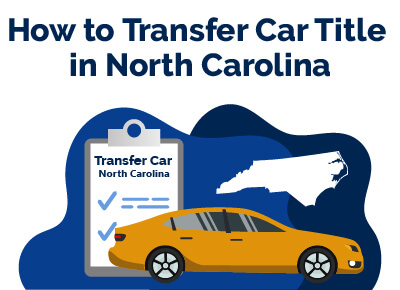How To Transfer Car Title in North Carolina
June 5, 2023


Chris is Head of Content for FindTheBestCarPrice and is based out of Philadelphia, PA. As a seasoned automotive industry analyst and car enthusiast, he ensures the highest level of quality across all our content and curates our picks for the best deals each month.
Chris studied information systems and marketing at Drexel University and writes about a wide range of topics ranging from car buying tips to troubleshooting common mechanical issues.
When he’s not thinking about cars, he likes to stay in with his dog and make an “attempt” to finish a crossword puzzle (he’s not quite at the Saturday/Sunday level…yet). As a former cheesemonger, Chris still has a “sharp” passion for all things cheese, and his fridge is always loaded with it!
Chris also has a passion for things that go fast, and drones are no exception. He spends some of his time writing for Dronesourced.
Whenever you intend to change ownership of a vehicle in North Carolina, it is necessary to transfer the title.
The reason could be because you wish to give or inherit the vehicle to a family member or for the more common purpose of selling it privately. In North Carolina, you must transfer the title before registering a vehicle, whether purchasing or selling it.
Fortunately, the process for transferring titles in North Carolina is relatively uncomplicated, and the DMV handles it.
The DMV will provide adequate help to help facilitate the procedure. You'll also be required to provide proof of your identity, vehicular title, insurance coverage, and fees payment,
However, it is vital to comply with state law while completing the necessary steps. In this article, we will be talking about how to transfer a car title in North Carolina.
Let’s get started!
Table of Contents
- What Does a Title Transfer Mean?
- How To Transfer Car Title in North Carolina
- How To Transfer Car Title in North Carolina When the Owner Is Deceased
- Transferring the Title of an Inherited Vehicle in North Carolina
- Gifting a Car to Someone
- Cost of a Title Transfer in North Carolina?
- Registering a Car in North Carolina
- Vehicle Inspection in North Carolina
- Best Car Deals by Category
What Does a Title Transfer Mean?
The ownership of a vehicle is established by its title; hence, the act of transferring a title represents a transfer of ownership of the vehicle.
This transaction necessitates distinct procedures for both the buyer and seller. The seller must relinquish ownership by endorsing the title.
In contrast, the buyer must present the endorsed title to the DMV, which will then issue a new title and registration for the vehicle.
Title transfers enable the DMV to monitor the legal possession of a given vehicle.
How To Transfer Car Title in North Carolina
The transfer of a North Carolina car title involves two distinct stages. Firstly, the buyer and seller must meet in person to exchange payment and complete the physical certificate of title.
Upon affixing their signature onto the certificate of title, the buyer acquires the legal ownership of the vehicle.
Subsequently, the buyer must conclude the car title transfer process by fulfilling the necessary formalities with the North Carolina Department of Motor Vehicles, including registering the vehicle and procuring new license plates.
While the initial meeting between the parties is crucial, the second stage is necessary.
In the role of the seller, your responsibility is to formalize the entire transaction by transferring the ownership of the car to the buyer by signing the title certificate. After this, you may remove the license plates and relinquish vehicle possession.
As the buyer in a private car sale, ownership is legally transferred to you as soon as the seller signs over the title. To obtain legal ownership of the vehicle, you must finalize the registration process with the DMV.
This involves obtaining the title and registration in your name and acquiring new license plates and car insurance specific to North Carolina.
How To Transfer Car Title in North Carolina When the Owner Is Deceased
In the event of the vehicle owner's demise, the new owner must follow specific protocols to transfer the vehicle's title. As the deceased's estate recipient, you must transfer the title to your name if you wish to retain, donate, or vend the vehicle to another individual.
As a surviving spouse, joint-owner, or beneficiary, you hold the legal power to transfer the vehicle's title to another person after the owner's passing.
Transferring the Title of a Car in a Probated Estate
When an individual who owns a vehicle passes away, the course of action for transferring the vehicle's title hinges on whether the title was solely under the decedent's name or joint ownership.
In the former case, it is essential to determine if the decedent's estate is undergoing probate.
Probate is a legal process that establishes the validity of the last will when no living spouse or beneficiary is specified in the will.
The process also involves executing the estate of the deceased individual, which includes distributing their property in line with their wishes.
If the car is part of a probated estate, the new owner must follow specific steps to transfer the title of the deceased person's vehicle. They include the following:
1. Contact an Attorney.
Seeking guidance from an attorney or contacting Probate Court is imperative for the administrator or executor of the deceased to navigate the probate process.
It is important to note that transferring a vehicle's title can only occur once the probate process is concluded.
Upon completion of probate, the heir will receive the vehicle unless the executor is granted ownership. Should the executor obtain the vehicle, they may opt to retain or vend it.
2. Gather the Necessary Documentation.
The documentation required to transfer the vehicle title in such a scenario varies by jurisdiction, but in North Carolina, the following documents are mandatory:
- The death certificate.
- An order from the Probate Court that authorizes the transfer of the vehicle title.
- The certificate of the vehicle title.
- An odometer disclosure statement.
- Payment for the transfer fee.
Transferring the Title of a Vehicle Without Probate
In North Carolina, specific criteria must be met before transferring a deceased person's vehicle title.
The estate's total value must not exceed a specific threshold, and a certain period must have elapsed since the individual's passing.
However, suppose you are the estate's administrator, spouse, beneficiary, or joint owner. In that case, you may only need to furnish the death certificate and the vehicle's title to the local NC title office. They will retitle the vehicle without the need for legal professionals or court orders.
Transferring the Title of an Inherited Vehicle in North Carolina
If you have inherited a vehicle from your spouse, and the will has undergone the probate phase, you must visit your local NC DMV and furnish the following documentation:
- Letter of administration or court certificate.
- A certified copy of the will.
However, if there is no will or if the will is not undergoing probate, you must present an affidavit containing the following information:
- Name and date of death of the late vehicle owner.
- A statement indicating that the person died intestate or that the will is not undergoing probate.
- A statement disclosing that the deceased individual's debts have been settled or will be paid through the sale of the vehicle.
- Age, name, and relationship of the heirs mentioned in the will (if applicable).
- Name and address of the new car owner.
In addition to the documentation above, there may be other documentation that you need to provide to transfer the vehicle title successfully in this scenario in North Carolina.
Gifting a Car to Someone
If an individual has received a vehicle as a gratuitous transfer or if a relative is transferring the vehicle, it becomes incumbent upon them to effectuate a vehicle title transfer at their local NC DMV branch by adhering to the identical steps required when engaging in a vehicle purchase or sale within the state of North Carolina.
Write "0" in the space provided in the price section. The recipient of the vehicle may be exempt from paying the sales tax on the vehicle.
You must fill out the transfer of ownership sections on the back of the original vehicle title, just like with a private vehicle sale.
Even though the car is being gifted to a relative, they may still owe a tax on the current market value when registering it.
Ensure that the recipient of the vehicle takes the signed original vehicle title to the city clerk to complete the application for a new vehicle title.
Cost of a Title Transfer in North Carolina?
In North Carolina, a fee for titling a vehicle is imposed, along with the requirement to pay all applicable vehicle taxes and registration fees that vary based on your circumstances.
Failure to execute an out-of-state vehicle title transfer within a month of introducing a non-resident vehicle to NC will result in additional charges for tardiness.
In particular, the vehicle titling fees in North Carolina include $52 for the certificate of title, $20 for the vehicle plate transfer, and 3% for the Highway Use Tax (HUT).
You must possess the above payments and documents about your vehicle situation to avoid unnecessary fines and sanctions.
Registering a Car in North Carolina
A proper safety and emissions inspection report must be presented to initiate the registration process for your automobile in North Carolina.
Furthermore, the registration fee must be paid in addition to the mandatory taxes. The registration cost for a vehicle in North Carolina is $38.75 yearly, in addition to any relevant county taxes.
Vehicle Inspection in North Carolina
The state mandates that its inhabitants subject their vehicles to an emissions test within North Carolina. This particular examination is only compulsory in 48 of North Carolina's counties. In addition, most vehicles in this region must satisfy the vehicle safety inspection requirements.
The state of North Carolina is evaluating its prevailing emissions testing regime to broaden the range of counties granted exemption from participating in the testing procedure.
North Carolina comprises 100 counties, and 48 of these areas must undergo smog checks for gasoline vehicles produced in 1996 or later and vehicles that weigh less than 8,501 pounds.
To fulfill these requirements, vehicles must complete both a safety inspection and a smog check.
Best Car Deals by Category
Posted in Car Buying Tips, Car Troubleshooting |




